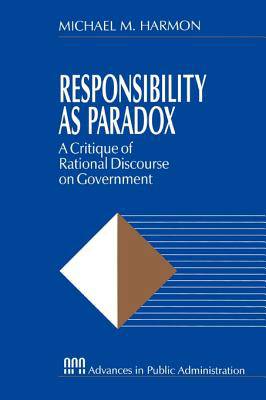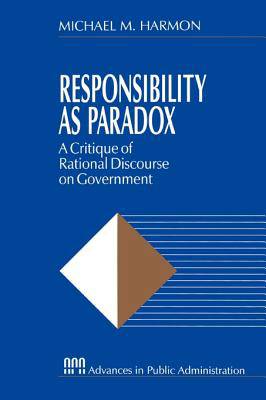
- Afhalen na 1 uur in een winkel met voorraad
- Gratis thuislevering in België vanaf € 30
- Ruim aanbod met 7 miljoen producten
- Afhalen na 1 uur in een winkel met voorraad
- Gratis thuislevering in België vanaf € 30
- Ruim aanbod met 7 miljoen producten
Zoeken
€ 160,45
+ 320 punten
Omschrijving
Sponsored by the Public Administration Theory Network and Lewis and Clark College "A masterly philosophical approach to a question that is of particular interest to those involved in public administration." --International Review of Administrative Sciences "Michael M. Harmon′s new book provides a fresh, new approach to issues of administrative responsibility. The dilemmas faced in charting responsible behavior in pursuit of the collective interest are beautifully described. The book is must reading for anyone who wants to confront ethical issues as they really exist in modern government." --Frank P. Sherwood, Reubin O′D. Askew School of Public Administration and Policy, The Florida State University "Harmon′s book is the first of a series designed to satisfy a long-standing need ′to reexamine and enrich thinking in the field of public administration.′ . . . Harmon argues that acceptance of personal responsibility may enable one to avoid certain pitfalls resulting from compliance with rationalist emphasis on institutional accountability and obligation. The author urges public servants and citizens to resolve the moral uncertainty stemming from the conflict between personal and institutional responsibility." --Choice Creating a new paradigm, Responsibility as Paradox reframes the theoretical and practical discourse on responsibility in government. Mainstream literature on this subject holds that responsible action is synonymous with legally or morally correct action. This belief, the author argues, is fundamentally flawed owing to the paradoxical character of responsibility, which embodies two opposing ideas: moral agency and accountability to institutional authority. By ignoring the personal, subjective nature of responsibility, which inheres in people′s status as moral agents, rationalist responsibility generates three "vicious" paradoxes: obligation, agency, and accountability. Responsibility as Paradox demonstrates how, for each of these three paradoxes, the meanings of agency and answerability may be transformed into creative tension with one another, revealing responsibility as a continuing struggle to integrate the requirements of institutional authority with the dictates of conscience and the unique contingencies of administrative situations. Responsibility as Paradox is essential reading for students and others interested in public administration and political science.
Specificaties
Betrokkenen
- Auteur(s):
- Uitgeverij:
Inhoud
- Aantal bladzijden:
- 245
- Taal:
- Engels
- Reeks:
- Reeksnummer:
- nr. 1
Eigenschappen
- Productcode (EAN):
- 9780803970083
- Verschijningsdatum:
- 1/06/1995
- Uitvoering:
- Paperback
- Formaat:
- Trade paperback (VS)
- Afmetingen:
- 154 mm x 229 mm
- Gewicht:
- 408 g

Alleen bij Standaard Boekhandel
+ 320 punten op je klantenkaart van Standaard Boekhandel
Beoordelingen
We publiceren alleen reviews die voldoen aan de voorwaarden voor reviews. Bekijk onze voorwaarden voor reviews.











